Michael Doran is a Senior Fellow at the Hudson Institute in Washington, DC. specialising in Middle East security issues. In the administration of President George W. Bush, Doran served in the White House as a senior director in the National Security Council, and as a senior advisor in the State Department, and a deputy assistant secretary of defence in the Pentagon. He has held teaching positions at NYU, Princeton, and the University of Central Florida. His book, Ike’s Gamble: America’s Rise to Dominance in the Middle East, was published by Free Press in 2016. He stirred controversy recently with his claim that there is ‘a coherent strategy toward the Middle East taking shape in the Trump administration’. He spoke to Fathom editor Alan Johnson on 18 November 2019.
Part 1: Influences
Alan Johnson: What have been the major intellectual influences and experiences that have formed you as a foreign policy thinker?
Michael Doran: Mark Mancall, a professor at Stanford, introduced me to intellectual and academic life. He encouraged me to study the Middle East and go to Israel and that was probably the single biggest influence on my career, if not my life. I went to Israel in my junior year and stayed from 1983-87 aged 21 to 24. I didn’t have any family or religious connection to Israel but I learnt Hebrew and fell in love with the country very quickly. Israelis have a very different experience of the world and I was able to immerse myself in their different way of thinking. Once you do that, walk in someone else’s shoes, it changes your perspective on history and foreign policy. So when I wrote a diplomatic history of the 1948 Israeli-Arab war for my PhD thesis, I was sure to use more than one national archive. Once you break yourself loose from your own country’s basic assumptions about the world in order to understand somebody else, you can more easily adjust to understand the points of view of third and the fourth parties.
Part 2: ‘Counter-Terrorism’ is not a Strategy
AJ: Back in January 2019 you wrote an article in Mosaic titled ‘The Strategy Washington Is Pursuing in the Middle East Is the Only Strategy Worth Pursuing’. It got a lot of attention, some of it very critical. You gave us the short form version of that strategy: ‘In the Middle East, the choices aren’t wonderful. When you add them up, the problem is the rise of Iranian power, so you have to work with states to help you push back. And there really are only three states that can effectively do this: Israel, Saudi Arabia, and Turkey. Can you give the reader the long form version of the strategy?
MD: Let me begin by taking quite a few steps back, in order to provide a context for the argument I am making about Trump’s strategy, because that argument is part of a critique of US foreign policy in the Middle East as it has developed since the end of the Cold War, and particularly since 9/11. In short, I think we have gotten away from the fundamental principles of grand strategy, which concern states and interests.
After 9/11 we saw the ascent of the notion of ‘counter-terrorism’ to the number one goal of the US in the region (manifested as ‘The War on Terror’). I witnessed this development myself when I was in the White House during the second term of George W. Bush. But counter-terrorism is not a strategy. You see, the Middle East is very complex, with cross-currents that are difficult to understand, let alone navigate. It is not always obvious who is a friend and who is an enemy. By contrast, think of NATO. While some members are more troublesome than others, you still have a structure that enables a president to easily differentiate friend from foe. The situation is similar in East Asia where the US has a number of bilateral treaties with its partners, including Japan and South Korea. Well, it’s not like that in the Middle East. There, you have to have a very clear conception of who is friend and who is foe and act accordingly, strategically. We have not done that for some time.
In the White House, the guys who know exactly what they want to do are the counter-terrorism guys. They have a strong view of what needs to be done, they possess the tools to do it, and they have the domestic political mandate. However, as I have said, counter-terrorism is not a strategy. It is only a tool that should be used within the context of a strategy. The result is that we have been over-emphasising non-state actors while not working properly with states. We lost our understanding that the point of strategy is to establishing a political order in the region, and that means a state order.
AJ: Why should states be put at the heart of grand strategy?
MD: Because the job of the US is not to create a perfect world but to create a political order. Sure, one can remove terror organisations, but if the result is to create political vacuums, then those vacuums will be filled by states, because states are the fundamental actors in Middle Eastern politics. If you do not get the question of political order right, then you commit superpower malpractice and you get the results we see in the Middle East.
Military prowess is not enough. The US has demonstrated its military prowess. Take the November 2019 raid that killed IS leader Abu Bakr al-Baghdadi. There are very few countries in the world that can carry out a raid like that, and without casualties. But we have not transferred our military successes into long-term political successes. Instead, we have created vacuums in the region that have been filled by militias that are obtaining increasingly sophisticated military and technological capabilities from Iran.
Take the attack on the Saudi Aramco-owned Khurais oilfield and Abqaiq oil processing facility in September 2019. That Iranian strike worried Israel because it could see that it was a combination of drones and cruise missiles. Given the missile capabilities of Iran and Hezbollah, could similar strikes penetrate key Israeli sites, the Dimona reactor included, in spite of the sophistication of Israeli defences? If so, that is a much bigger strategic threat than the 20,000 guys with machine guns and pickup trucks that we elevated to the Number One Threat in the region in our ‘counter-terrorism’ approach to strategy.
When counter-terrorism becomes a substitute for strategic thinking, it creates a space into which Iran moves. Why? Because counter-terrorism does not deal with the fundamental basis of international politics: support your friends and punish your enemies. When you come into the Middle East with this misguided counter-terrorism/’War on Terror’ approach and you do not focus on differentiating between friend and enemy (and on helping friends and hurting enemies), you find yourself in no man’s land where no ally trusts you and no enemy fears you.
Part 3: What Obama Got Wrong
AJ: Why are you so very critical of Obama’s Middle East strategy?
MD: The Obama administration alienated its traditional friends because of its foe-friendly, i.e. Iran-friendly approach. Foreign policy was directed toward ending the Iraq and Afghanistan campaigns and pulling US forces out of the region. This created a vacuum and into that vacuum appeared IS and Iran. In July 2015, when the JCPOA nuclear agreement was concluded, Obama’s immediate response was to bring the Iranians into formal diplomacy on the Syrian civil war. He then turned a blind eye to the Russia-Iranian alliance that developed instantaneously. It was a strategic decision made in Washington but it was never acknowledged. In September 2015 that Russian-Iranian alliance started cooperating on the ground to shore up the Assad regime.
Back in 2012 Obama had nixed the strategic option to build-up moderate opposition forces against the Assad regime. So the US was a spectator to the conflict from 2012 to 2015. Once the JCPOA was finalised in July 2015, and Russia and Iran had made the strategic decision to re-impose Assad’s rule in Syria, the US had two strategic choices left: it could support Turkey or the Russia/Iran alliance. Obama decided to support Russia/Iran.
He pretended that the US was unaware of Russian-Iranian cooperation and put enormous pressure on Turkey to close the Syria-Turkey border, thereby cutting off support and supplies for Aleppo. At that stage of the conflict, the strategic prize was Aleppo and there was a corridor of support for the rebels of Aleppo from Turkey who wanted regime change in Syria. However, the US came down like a ton of bricks on Turkey, all in the name of ‘fighting IS’. When the Russians and Iranians surrounded Aleppo, they used the YPG to cut off Turkish support for Aleppo from the north. At the same time as the Russians and Iranians were using the YPG in the east, the US were using the YPG in the west. This effectively meant that the US, Russia and Iran were building a PKK state on Turkey’s southern border. Look, this is not how an ally behaves. Turkey never made their argument well in Washington (or the West more broadly) but they did have a very good argument: the US was not behaving appropriately toward an ally.
For example, in November 2015, when a Russian fighter bomber attacked Turkish rebels (probably trained by the CIA) on the Syria border fighting the Assad regime, the US did absolutely nothing. But when the Turks shot down a Russian jet, the US defined it as a bilateral Turkish-Russian problem, while putting enormous pressure on Turkey. The roots of the Turkish decision to purchase the Russian S-400 missile system (and Turkish disengagement from the West) can be traced to US foreign policy during this period.
In short, the US put the Iranians and Russians on the Syria-Turkey border just as it put the Russians and Iranians on Israel’s border. Friends reacted accordingly. For example, since 2015, one can see that the pace of Netanyahu’s visits to Moscow has increased dramatically. Why? Because he now has no choice but to work with the Russians on Israel’s security challenges in Syria.
The abandonment of the strategy of ‘strengthening friend and weakening foe’ starts with Obama and his alignment with the Russians and Iranians across the region. We turned a blind eye to the rise of Iranian-aligned militias in Iraq and we worked with the militias in Iraq to destroy IS in Iraq, knowing full well that the vacuum created would be filled by Iran. We did the same thing in Syria. The YPG/PKK alignment policy is completely consistent with that alignment with Iran.
Look, the YPG/PKK is traditionally a Russian and (to a certain degree) Iranian proxy whom we borrowed in order to defeat IS. We did it precisely because it would not drag us into the war with Assad. Obama made a strategic decision not to get involved in the war against Assad, to shut down Turkish efforts to topple Assad, and to allow the Iranians and Russians to shore up Assad. Meanwhile, so we thought, we would defeat IS with the YPG/PKK and then conduct negotiations between the Assad regime and the YPG/PKK. This was their political vision but they never gave expression to it.
In consequence, the US never conducted discussions with Ankara about how to build a political order in northern Syria and weaken the YPG/PKK (Turkey’s main adversary). Instead we fed the Turks a nonsensical and misleading line that the US relationship with the YPG/PKK was temporary, tactical and transactional. The Kurds, meanwhile, were building up their military capabilities and international legitimacy, and vastly increasing the geographical expanse of their activities and control. It is shocking, if you think about from an ally’s point of view.
There are two things that the US never asked the YPG/PKK to do. We never asked them to break relations with the Assad regime. In Qamishli, the YPG/PKK always had regime elements (Hezbollah included) present and they used an airport to resupply the regime position in Deir Ezzor. It was very important for the regime to retain a presence in all corners of Syria to one day to retake each territorial unit lost during the conflict. In February 2019, General Joseph Votel testified that US deployed forces did not have a military mission to counter Iran. In other words, we were never using the YPG/PKK to counter Iran but to avoid a conflict with Iran in Syria.
Part 4: Trump’s Middle East Strategy
AJ: Your support for Trump’s decision to pull troops out of Syria has sparked a controversy in foreign policy circles. ‘Doran has lost it’ was the opinion of one expert I spoke to! Donald Trump has recently retweeted you twice, which in Washington’s professional foreign policy circles, as Liel Leibovitz has noted, is ‘the mark of Cain.’ And for many observers, the withdrawal of US forces from Syria has been a shameful betrayal of, precisely, a friend: the Kurdish force that helped the US defeat IS. That is why Kurds, who saw many of their folk die in that fight, threw vegetables in disgust at the retreating US troops. Nonetheless, you defend the US withdrawal as, precisely, a return to a more realistic strategy of supporting friends and opposing foes. Can you explain your thinking?
MD: When Donald Trump was elected president he initially continued the Obama strategy of utilising the PKK/YPG (which the US re-branded as the Syrian Democratic Forces, the SDF) to extinguish IS, a strategy that alienated Turkey. On the ground in north-east Syria, the PKK/YPG was defending our bases, so the choice Trump faced when it came to our troops there was stark. On the one hand, he could work with Turkey to create a political order in north-east Syria using US forces to satisfy a key ally, Turkey, by ensuring that the PKK/YPG did not have domination of the major political institutions of Kurdish-populated north-east Syria and that other Kurdish political parties would be able to have a vote in the governing structures. But that option would have pitted the US troops against the PKK/YPG who were providing the defence of our parameter. We would have had to deploy more troops and resources into north-east Syria and get into a conflict with our ally Turkey.
The US has been alienating Turkey and we needed to move in the other direction. Look, the entire objective of Operation Euphrates Shield (August 2016 to March 2017) – a cross-border military operation conducted by the Turkish Armed Forces and Turkey-aligned Syrian opposition groups in the Syrian civil war which led to the Turkish occupation of northern Syria – was to have a finger of Turkish power in Syria and ensure that western Rojava could not link up geographically with eastern Rojava. The Turks invaded the Afrin region for similar reasons, i.e. to clear out the PKK/YPG. Turkey has said repeatedly that it simply could not allow the establishment of an YPG-dominated state, yet all US strategy was relying on exactly that in the Rojava and Afrin Region. Turkey made it very clear, time and time again, that it would not permit the establishment of an YPG-dominated state.
And we were never going to stop Erdogan. Trump might have been able to put pressure on Erdogan to prevent this intervention in this form, but he would have had to put more troops into Syria and dedicate himself to the establishment of a PKK state in permanent opposition to Turkey. What would that do to the strategy of competing with the Chinese and Iranians in the Middle East? It would have pushed Turkey into the arms of the Russians, which is what we’ve been doing all along. It makes no sense from the point of view of grand strategy.
We tend to caricature of Erdogan’s policies and whitewash everything that the US has done. We do not pay any attention to the centrality of the Kurdish question to Turkish foreign policy. We have many issues with Erdogan, yes, but the US drove Turkish nationalist opinion behind Erdogan. If you wanted to build up Erdogan, then building up Rojava while spitting in his face and calling him a terrorist sympathiser was the way to do it.
AJ: You think we romanticise the Kurds?
MD: Absolutely. It shocks me that when I talk to some elected leaders responsible for foreign policy, and to policy people on the Hill, they say ‘well, we like the Kurds’. My response is ‘which Kurds’? They do not make a distinction between ‘the PKK’ and ‘the Kurds’. The Barzani faction in Iraqi Kurdistan hates the PKK, and the PKK hates it. We could have gone into some of the Kurdish areas of northern Syria with the help of Barzani’s Peshmerga, which has good relations with Turkey, but we chose not to do that.
The Turkish problem is not with ‘the Kurds’, but with the PKK/YPG. Yet the story that is told in the US is a version of the Seven Samurai / Magnificent Seven, whereby the local townsman (the YPG) are threatened by an malevolent force (IS), but a benevolent force (the US) saves the townsman, until another evil force (Erdogan) snatches away this beautiful ending to the movie. This is a caricature. It has appeal because there have been so few American successes in the region. This story enables Americans to feel good about themselves. But it ignores all the US decisions that were made in the face of very clear public proclamations by Turkey that a YPG/PKK statelet on its border was a non-starter.
Part 5: Trump’s Strategy and Israel
AJ: You have said that you are ‘a big supporter of Israel on an intellectual and an emotional level’. Yet you accept that the logic of the strategy you propose / Trump is pursuing, is that ‘If the Israelis have any hope of preventing Syria from becoming a permanent Iranian military base, they must act alone.’ Some Israelis worry this approach throws Israel under a bus. Martin Kramer notes that ‘a Who’s Who of Israel’s ill-wishers have had no problem welcoming Trump’s move’ and they have been ‘echoed by the A-list of America’s most outspoken minimisers of the danger posed by Iran.’ What are the implications for Israel of Trump’s Middle East strategy?
MD: Let’s review things. I wrote an article recently for Foreign Affairs in which I explained that there have really been two notions of ‘land for peace’, not one. The original US idea, which we see in the Eisenhower administration, and which we returned to in the 1990s, was that if we get too close to Israel it will push the Arabs into the arms of the Soviet Union. In this version of land for peace, the goal of the US is to put a ring around Israel, reach out to the Arabs and try to make peace by forcing concessions from the Israelis. We witnessed this policy in action during the Suez crisis in 1956 when Eisenhower forced the Israelis to withdraw from the Sinai while securing almost no concessions from Nasser. The result was to hand Nasser a political victory and turn Egypt into the strongest Arab state in the region – a status that Nasser then used to undermine the US everywhere in the region.
The US learnt from that outcome. By the time we get to the 1967 war, the US were completely disillusioned with Nasser and no longer believed in detaching Egypt from the Soviet Union by pressurising Israel. So when the Israelis defeated Egypt in 1967, the US read that as a victory for the West against the Soviet Union. A different understanding of ‘land for peace’ developed under the Johnson and Nixon administrations: part of a more realistic understanding of Israeli power as an asset to the US, able to put pressure on Soviet proxies such as Egypt. The US now made it clear that while it could act as a mediator between Egypt and Israel, the price of American mediation was for Egypt to disengage itself from the Soviet sphere of influence. The Sinai disengagement agreements of 1973 and 1974 are the first successes you can attribute to that strategy.
Using Israeli power as an adjunct of US power was Kissinger’s strategy and it was successful. But here is the thing – it was the Carter administration that then reaped the biggest benefit of Kissinger’s strategy in the form of the 1978 Israel-Egypt peace agreement: the greatest US diplomatic achievement in the Middle East. The flipping of Egypt from the Soviet camp to the US camp was credited to Carter and his ideas, though I postulate that it is Kissinger that deserves significant credit for this achievement. It was Kissinger, not Carter, who established the fundamental conditions for peace through his conception (not Carter’s) of ‘land for peace’. However, because this achievement is attributed to Carter, it was his conception of land for peace that got a new lease of life after the end of the Cold War and it is Carter’s conception that has underpinned the ‘peace process’. The Carter administration, not understanding the basis of its own achievement, returned to older notion that Israel was a liability not an asset to US interests. Carter believed that the US needed to distance itself from Israel. He also injected into US foreign policy the misguided idea that the Arab-Israeli conflict (the Israeli-Palestinian conflict in particular) was at the centre of all conflict in the Middle East and that solving this conflict could be the beginning of a grand Pax-Americana across the whole region.
Although the Carter conception of land for peace was pie in the sky, devoid of an understanding of how the world works, it returned in a big way in the 1990s. We once again came to believe that if only the US would pressure Israel enough, the region’s bad guys would melt away and the US could establish Pax-Americana there. So the Clinton and Obama administrations focused their diplomatic efforts on the peace process, based on the Carter land for peace formula, and it got nowhere. That formula has no successes to its name. The 1994 Israel-Jordan Peace Treaty, which is a success, did not follow the Carter formula.
Now, when it comes to the Kurds, the Israelis and the pro-Israelis in the US have a particular form of the idealism that we talked of earlier. It comes from the fact that the Israelis have a deep sense of disappointment, even betrayal by Turkey. You know, there was a quiet love affair between Israel and secular and Kemalist Turkey. Israel saw that Turkey as a distant cousin and it that gave them hope that that kind of secular nationalism would be the direction in which the Middle East as a whole would go. In the 1990s, the Israeli and Turkish militaries had a fantastic relationship and that gave Israel strategic depth. However, Turkey went in a very different direction, with Erdogan claiming to speak for Hamas and the Muslim Brotherhood, and the Israelis felt stabbed in the back. The rise of Erdogan, who has particularly hostile attitudes toward Israel, the sight of a muscular Turkey that supports Hamas, combined with the US withdrawal from the region is all very scary for Israel, for sure. And the Israelis transferred their romantic attachments from Turkey to the highly secular Kurdish people who have suffered genocidal attacks reminiscent of Jewish history. There is an enormous amount of emotion that goes into those ideas.
But any threat from Erdogan pales in comparison to the threat posed by Iran which has spread militias with precision strike capabilities around the region; that is a strategic threat. Erdogan is a threat, sure, but he is separated from Israel by Syria, and his primary concern is the Kurdish question, not sending rockets and missiles to Israel. I think that the true level of threat posed by Erdogan is miniscule in comparison to the threat posed by Iran. It has been blown out of proportion for emotional reasons. It is similar to the kind of threat that Israel faced historically, in, say, the 1980s and 1990s from Saudi Arabia. It was a problem for Israel, but a manageable problem.
Look, the Obama strategy – which continues to influence policymakers and the press – puts the Russians, Iranians and Iranian-aligned militias on the Syria-Israel border and the Syria-Turkey border. Democrats continue to support this strategy, by the way. The Israelis remember that every time the Israelis took military action against Iranian-aligned Syria, this was strongly opposed by the Obama administration, albeit in a passive aggressive manner. Remember the accusation that Israel was spying on the administration? Remember the leaking of covert Israeli actions in Syria? On the other hand, the Trump administration has reinforced US-Israeli cooperation by putting THAAD missiles, temporarily, in Israel and giving the Israelis a green light to conduct operations in the region including against militias in Iraq, which is incredible when you consider that such operations have led to direct threats from Iranian-aligned militias against US forces in Iraq. The Obama administration would likely never have permitted these developments. Its echo chamber would have insisted, instead, that US forces were being gravely endangered by Israeli actions.
The speed at which people have forgotten what it was like for Israel operating under the Obama administration is shocking to me. Israel is getting an enormous amount of diplomatic support for its military actions combined with an American military backstop, which increases its ability to negotiate with the Russians and which puts the Iranians in a difficult position against Israel. Ok, it is not perfect, but such imperfection is the reality that the Israelis have dealt with since the founding of the State of Israel. Think about the Yom Kippur War or War of Attrition when the Soviets were manning aircraft positions and equipping the Egyptian army, and Israel had to stand alone with only US diplomatic support. We have seen this kind of scenario before, and today the military balance is much better for Israel. It is not pleasant for Israel, to be sure, but nothing to get apocalyptic about.
Part 6: Grand Strategy, Domestic Politics and the Washington Bubble
AJ: Elliott Abrams, your old boss, also questioned your claim that a ‘muscular’ or neoconservative approach is off the table because of the public mood. He argued there was no pressure from Dems or Republicans or the public to get US troops out of Syria or Afghanistan. Those were decisions that ‘should be attributed to the president’s own views, not to voter insistence.’ For myself, I think anyone who does not see that the public mood across the west has changed radically is not paying enough attention, but what do you think?
MD: The American electorate has sent a very clear signal in three presidential elections: it is unwilling to put large numbers of American troops on the ground in the Middle East. If you look at the amount of political capital that the George W. Bush administration had to expend in support of the Iraq and Afghanistan campaigns, you will realise that that kind of operation is unlikely to happen again, barring some kind of national cataclysm.
During the Iraq campaign, we got used to a permissive environment that enabled an administration to carry out its desired operations, but those days are over. We need to understand exactly where the US public is and draw the obvious lesson: we now have to work through proxies on the ground. And that takes us back to friends and enemies, and to states. The US still has interests in the region and it must look after these interests, but it cannot look after its interests primarily through unilateral military action in the region. It requires assistance from allies. So the question is very simple: who are our allies and who are our enemies (and how do we support our friends and punish our enemies)? And with that question we are back to state actors.
AJ: You have talked of a ‘great disconnect’ between the ideas of the foreign policy elite and the public – ‘who simply do not see how US foreign policy is good for them or for the country’. Do you think these foreign policy elites ‘get’ that there is this disconnect and that doing politics today means dealing with that disconnect? Or do they think ‘after Trump, us (again)’? Do they envisage a simple reboot of the old interventionist system?
MD: No, they do not get it. If you asked them to sit down and explain what is needed to hold onto this position in northern Syria and use it effectively against Iran, they would probably say that Trump only needed to tell Erdogan to ‘sit down and shut up’ and Erdogan would comply. Well, play out that scenario: in fact we would get into a very serious conflict with Turkey, and what are the consequences of that? They may say ‘well, threaten sanctions’. But if Trump had decided to use sanctions to destroy the Turkish economy, would Turkey have crawled back to the US and apologised for getting upset over the YPG/PKK state that it was building? I do not think so. Be realistic: they are going to go the Russians and Iranians, and then what? There is a real failure of imagination. People talk about Erdogan and Turkey as hostile to America without totalling up all the capabilities that Turkey has, and without imagining what the Middle East would be like for us if Turkey put those capabilities to work undermining us, like the Iranians have. That is a horrendous picture. Another scenario they suggest is that we have to put troops on the ground in northern Syria. But would Americans support that policy?
As you play out each of these scenarios, you realise how detached they are from political reality and that nobody (Democratic or Republican) sitting in the White House could enact these ideas.
AJ: So why don’t the foreign policy experts ‘get’ it?
MD: I think that there actually is a Washington bubble. When I used to hear Republicans and Democrats talk about the Washington bubble, I never took the expression seriously. But now I believe it exists. People who hold these positions work at Washington-based think tanks and they never have to travel to Iowa and Wisconsin and sell these positions. Their jobs are safe regardless of whether they can sell their positions to the electorate or not.
Another reason is that the think tank world is dominated by progressive ideas, and this true on the left and right. There is left-wing progressivism and right-wing progressivism. Left-wing progressivism wants the US to use its military and economic power to strengthen multilateral institutions while right-wing progressivism is more comfortable with unilateral military action but still bound by an ideological standpoint of attempting to transform the world, rather than simply defending the American national interest. That’s where the bubble is.
Part 7: Back to a ‘Cold War Template’?
AJ: In place of either neoconservative interventionism or libertarian isolationism you advocate ‘a return to a cold-war template’ when, so you argue, the US ‘worked through regional proxies to thwart the Soviet Union and, after some initial missteps … did so quite effectively.’ Can you describe that template to the reader?
MD: First of all, let me be clear. We do need a global American strategy. I do not want the US to contract as it did with its post-First World War strategy. I want the US to remain not just engaged but a leader, and not only in the Middle East but globally. But I am convinced we need a new strategy for our age and that pushed me to go back and look again at what I consider to be the most successful grand strategy: the US policy of containment during the Cold War.
I was struck by what Truman’s Secretary of State Dean Acheson said in his memoirs about how they developed the strategy of containment. The Soviet Union’s aim is to achieve world domination by spreading its ideology, turning the world communist, so our aim should be simply to block that. With that aim, he could develop a conception of the strength of the Western coalition as lying in its diversity, and to contrast that to the weakness of the monolithic conception of the Soviet system. Truman’s containment strategy meant that what the US asked of allied states was only ‘do not adopt the Soviet system, and do not get in the way of us as we work against it’. We did not insist on each country having a particular political system or set of values. That is a beautiful strategic idea. And it is in sharp contrast to the idea that the goal of American foreign policy is to spread our values and system around the globe in the form of democracy, and that a true ally is one that signs up to our values and system. That is not the strategy that won the Cold War.
An updated version of containment could offer a guide to how the US should put together a successful global coalition against Iran today. On the basis of those principles, we can find a place for Turkey in it. To be sure, the Turks will not line up with us like the Saudis or Israelis and go against the Iranian axis, but there is much to be gained from them if we stop insulting them and sticking a thorn in their side in the form of the YPG/PKK. And there’s a lot to be lost if we don’t.

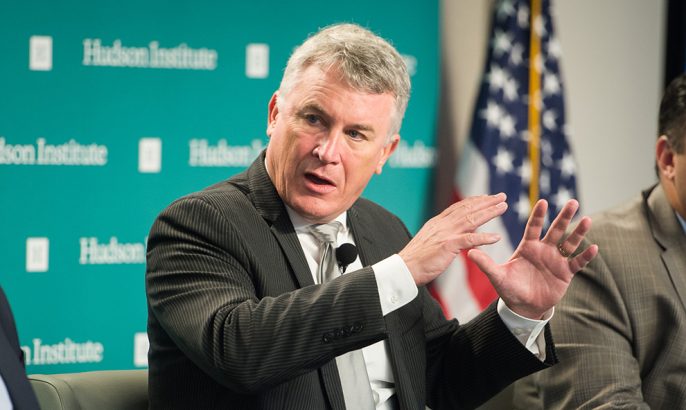

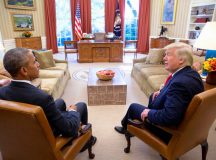
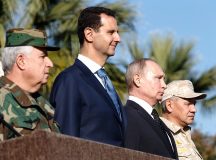
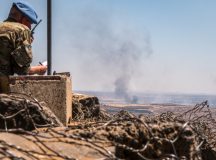
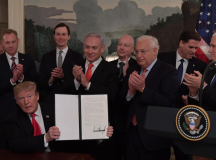
































I totally agree with Michael Doran’s analysis. The USA will benefit a lot by acting truly like an ally of Turkey and thereby winning the support of Turkey in the Middle East. The disagreements that Turkey has with the USA have nothing to do with the way Erdogan governs. Although I do not support Erdogan, I still think (like Erdogan) that the USA should stop supporting PKK/YPG if they expect any cooperation from the Turkish government. (With or without Erdogan being in power).